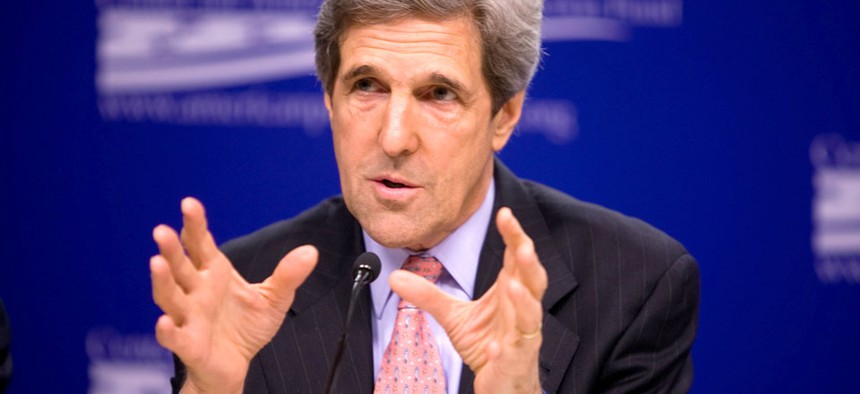
Secretary of State John Kerry Center for American Progress Flickr
For Now, Kerry's Afghan Election Deal Makes Him the Hero
20 hours of talks over the course of two days defused the crisis.
After Secretary of State John Kerry brokered a deal in the Afghan presidential election recount Saturday, he suddenly found himself on the elusive receiving end of some praise. Even The Wall Street Journal begrudged him this:
Secretary of State John Kerry may finally have accomplished a major diplomatic breakthrough: saving the Afghanistan project from the jaws of defeat.
It took 20 hours of talks over the course of two days, but the crisis between the two presidential candidates was defused. The opposing sides agreed to a deal that will have United Nations inspectors as well as observers from the parties oversee the count of the eight million ballots cast in the June 14 runoff. Current Afghan President Hamid Karzai will postpone his successor's August 2 inauguration and continue on as president until the new government is formed.
“This job will not be done until Afghanistan’s leaders certify an election and honor the determination of millions of Afghans to make their voices heard,” Kerry said standing next to both candidates at a joint news conference Saturday night.
Kerry initially flew to Kabul after ex-foreign minister Abdullah Abdullah accused inspectors of rigging the election for his opponent, former World Bank official Ashraf Ghani, and threatened to form a parallel government if the vote wasn't independently verified.
Perhaps most significantly, U.S. officials confirmed Sunday that they have reached the framework for an agreement to reshape the Afghan government from its current centrally structured presidency to a parliamentary system with a prime minister serving as head of the government and a president serving as head of the state. Since the political system won't change for another two or three years, the winner of the current election will become president with the second-highest vote-getter named chief executive.
American officials said it had become increasingly clear that the Afghan election process gave too much control to the winner, which is dangerous in a country with many different ethnic and religious groups.
Also of major consequence, Saturday's agreement set the stage for American military personnel to stay in Afghanistan beyond 2014. This is something Karzai resisted, despite American urging. The U.S. sought a similar "Status of Forces" agreement when leaving Iraq in 2011, but failed due to the unwillingness of Prime Minister Maliki. With Iraq now fighting a civil war, the U.S. hopes to avoid a similar fate for Afghanistan.
"I think that's the message everybody's been getting from this," Said Sabir Ibrahimi an Afghanistan expert at NYU's Center for International Cooperation told The Wire.
In Iraq, Maliki purged Sunnis from his administration as he centralized power around a Shiite majority. With little role to play in the Maliki administration, many Sunnis turned elsewhere.
"When people do not have any input in determining their future and feel that the democracy that has been promised to them is a rhetorical farce, it leads to anarchy and extremism. Groups such as ISIL and the Taliban capitalize on these fears and hopelessness," Wazhmah Osman wrote in an op-ed in Al-Jazeera English Monday.
While Karzai maintains a relatively inclusive government despite centralizing power in the presidency, the United States seems unwilling to bet thirteen years of blood and treasure on the promise that his successors to take a similar approach.
The U.S. intervened in 2009 amid similar accusations of widespread voter fraud in the previous presidential election, which Abdullah eventually conceded to Karzai. There have been two additional election crises in the country in the past five years.
“You can say that the idea here is to make sure that Afghans don’t have to have negotiations to create an inclusive government each time they have an election,” an American official told The New York Times on the condition of anonymity Sunday.
The plan marks a change for U.S. officials who opposed such a framework in 2003 believing that a parliamentary system would be too unstable for a new democracy. Karzai has continued to express his strong opposition to a parliamentary system. Before any major changes can be made to the internal governmental structure, Abdullah and Ghani must uphold the vote count and agree on a unity government.
"The way the Afghans see it is that while the agreement is good news, they need to wait and see if the audit process goes well," Ibrahimi said. "Everyone is cautious."
If both parties maintain the deal, the inauguration of the new president will mark the first peaceful and democratic transfer of power in the history of Afghanistan.
NEXT STORY: Bowe Bergdahl Is Returning to Active Duty






